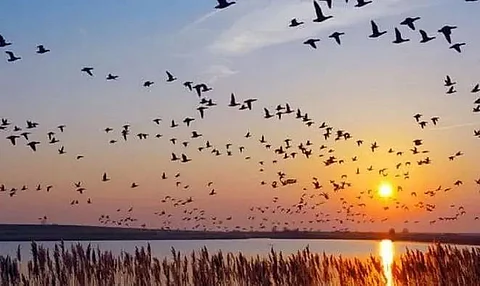
- Home
- Live Blog
- Breaking News
- Top Headlines
- Cities
- NE News
- Sentinel Media
- Sports
- Education
- Jobs

A CORRESPONDENT
DIBRUGARH: The Maguri-Motapung beel (wetland), once called a paradise for migratory birds, has witnessed a drastic fall in migratory birds visiting it.
Maguri-Motapung beel is situated near the Dibru-Saikhowa National Park in the Tinsukia district. The wetland is just 9 km from Tinsukia town. It is a famous tourist destination where tourists from all over the world come to watch migratory birds. The Maguri-Motapung beel is a natural habitat for many varieties of birds.
According to environmentalists, the Baghjan blowout affected the entire ecosystem of Maguri-Motapung beel badly, impacting birds and aquatic animals.
"Mahuri-Motapung beel was a paradise for migratory birds. But after the Baghjan blowout affected the entire ecosystem of the wetland. Earlier, during this season several migratory birds were spotted in the wetland. But now the birds are fewer in number. Even the local birds here have decreased in number compared to earlier times," said Ranjan Kumar Das, bird watcher and Vice-Principal of Tinsukia College.
He said, "Gone were those days when Maguri-Motapung was a paradise for migratory birds! After the Baghjan blowout and heavy silting, the entire wetland ecosystem has been damaged. I predicted this situation a long time back in 2006 in an article. I mentioned that due to siltation, the wetland will be filled with silt, and there will be no migratory birds. It is due to the illegal sand mining at the confluence of the Dangari-Dibru River."
"Due to the Baghjan blowout, the entire flora and fauna of the Maguri-Motapung beel were affected. Due to the deposition of condensate, the population of local fish has been affected. We cannot get the former charm of the Maguri-Motapung beel, known for birds. Various species of migratory birds come here during the winter season. Now they are not seen in the wetland," said Das, an Ornithologist.
Nirantar Gohain, an environmentalist, said, "The degradation of the Maguri-Motapung beel happened due to the Baghjan blowout. The wetland has lost its old glory. Earlier, the wetland was full of migratory birds, but now they are seen less in the wetland."
He added, "This has also impacted tourism. Earlier, tourists came in large numbers to see the rare birds, but now they are coming in fewer numbers. A bird habitat has finished, but who cares?"
Also Watch: